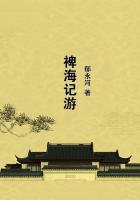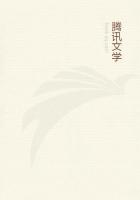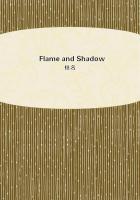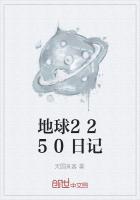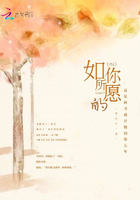A loud "A-a-ah!" rose up, followed by a fierce groaning from the camel, and a lethargic, yet violent, movement that threw them forward and backward. They sank. A hand from without pulled back the curtains and light streamed over them. They set their feet in sand, stood up, and looked about them.
Already they were far out in the desert, though not yet beyond the limit of the range of red mountains, which stretched forward upon their left but at no great distance beyond them ended in the sands.
The camels were lying down in a faintly defined track which was bordered upon either side by the plain covered with little humps of sandy soil on which grew dusty shrub. Above them was a sky of faint blue, heavy with banks of clouds towards the east, and over their heads dressed in wispy veils of vaporous white, through which the blue peered in sections that grew larger as they looked. Towards the south, where Arba lay on a low hill of earth, without grass or trees, beyond a mound covered thickly with tamarisk bushes, which was a feeding- place for immense herds of camels, the blue was clear and the light of the sun intense. A delicate breeze travelled about them, stirring the bushes and the robes of the Arabs, who were throwing back their hoods, and uncovering their mouths, and smiling at them, but seriously, as Arabs alone can smile. Beside them stood two white and yellow guard dogs, blinking and looking weary.
For a moment they stood still, blinking too, almost like the dogs. The change to this immensity and light from the narrow darkness of the palanquin overwhelmed their senses. They said nothing, but only stared silently. Then Domini, with a large gesture, stretched her arms above her head, drawing a deep breath which ended in a little, almost sobbing, laugh of exultation.
"Out of prison," she said disconnectedly. "Out of prison--into this!"
Suddenly she turned upon Androvsky and caught his arm, and twined both of her arms round it with a strong confidence that was careless of everything in the intensity of its happiness.
"All my life I've been in prison," she said. "You've unlocked the door!" And then, as suddenly as she had caught his arm, she let it go.
Something surged up in her, ****** her almost afraid; or, if not that, confused. It was as if her nature were a horse taking the bit between its teeth preparatory to a tremendous gallop. Whither? She did not know. She was intoxicated by the growing light, the sharp, delicious air, the huge spaces around her, the solitude with this man who held her soul surely in his hands. She had always connected him with the desert. Now he was hers into the desert, and the desert was hers with him. But was it possible? Could such a fate have been held in reserve for her? She scarcely dared even to try to realise the meaning of her situation, lest at a breath it should be changed. Just then she felt that if she ventured to weigh and measure her wonderful gift Androvsky would fall dead at her feet and the desert be folded together like a scroll.
"There is Beni-Mora, Madame," said Batouch.
She was glad he spoke to her, turned and followed with her eyes his pointing hand. Far off she saw a green darkness of palms, and above it a white tower, small, from here, as the tower of a castle of dolls.
"The tower!" she said to Androvsky. "We first spoke in it. We must bid it good-bye."
She made a gesture of farewell towards it. Androvsky watched the movement of her hand. She noticed now that she made no movement that he did not observe with a sort of passionate attention. The desert did not exist for him. She saw that in his eyes. He did not look towards the tower even when she repeated:
"We must--we owe it that."
Batouch and Ali were busy spreading a cloth upon the sand, ****** it firm with little stones, taking out food, plates, knives, glasses, bottles from a great basket slung on one of the camels. They moved deftly, seriously intent upon their task. The camel-drivers were loosening the cords that bound the loads upon their beasts, who roared venomously, opening their mouths, showing long decayed teeth, and turning their heads from side to side with a serpentine movement.
Domini and Androvsky were not watched for a moment.
"Why won't you look? Why won't you say good-bye?" she asked, coming nearer to him on the sand softly, with a woman's longing to hear him explain what she understood.
"What do I care for it, or the palms, or the sky, or the desert?" he answered almost savagely. "What can I care? If you were mine behind iron bars in that prison you spoke of--don't you think it's enough for me--too much--a cup running over?"
And he added some words under his breath, words she could not hear.
"Not even the desert!" she said with a catch in her voice.
"It's all in you. Everything's in you--everything that brought us together, that we've watched and wanted together."
"But then," she said, and now her voice was very quiet, "am I peace for you?"
"Peace!" said Androvsky.
"Yes. Don't you remember once I said that there must be peace in the desert. Then is it in me--for you?"
"Peace!" he repeated. "To-day I can't think of peace, or want it.
Don't you ask too much of me! Let me live to-day, live as only a man can who--let me live with all that is in me to-day--Domini. Men ask to die in peace. Oh, Domini--Domini!"
His expression was like arms that crushed her, lips that pressed her mouth, a heart that beat on hers.
"Madame est servie!" cried Batouch in a merry voice.
His mistress did not seem to hear him. He cried again:
"Madame est servie!"
Then Domini turned round and came to the first meal in the sand. Two cushions lay beside the cloth upon an Arab quilt of white, red, and orange colour. Upon the cloth, in vases of rough pottery, stained with designs in purple, were arranged the roses brought by Smain from Count Anteoni's garden.
"Our wedding breakfast!" Domini said under her breath.
She felt just then as if she were living in a wonderful romance.

